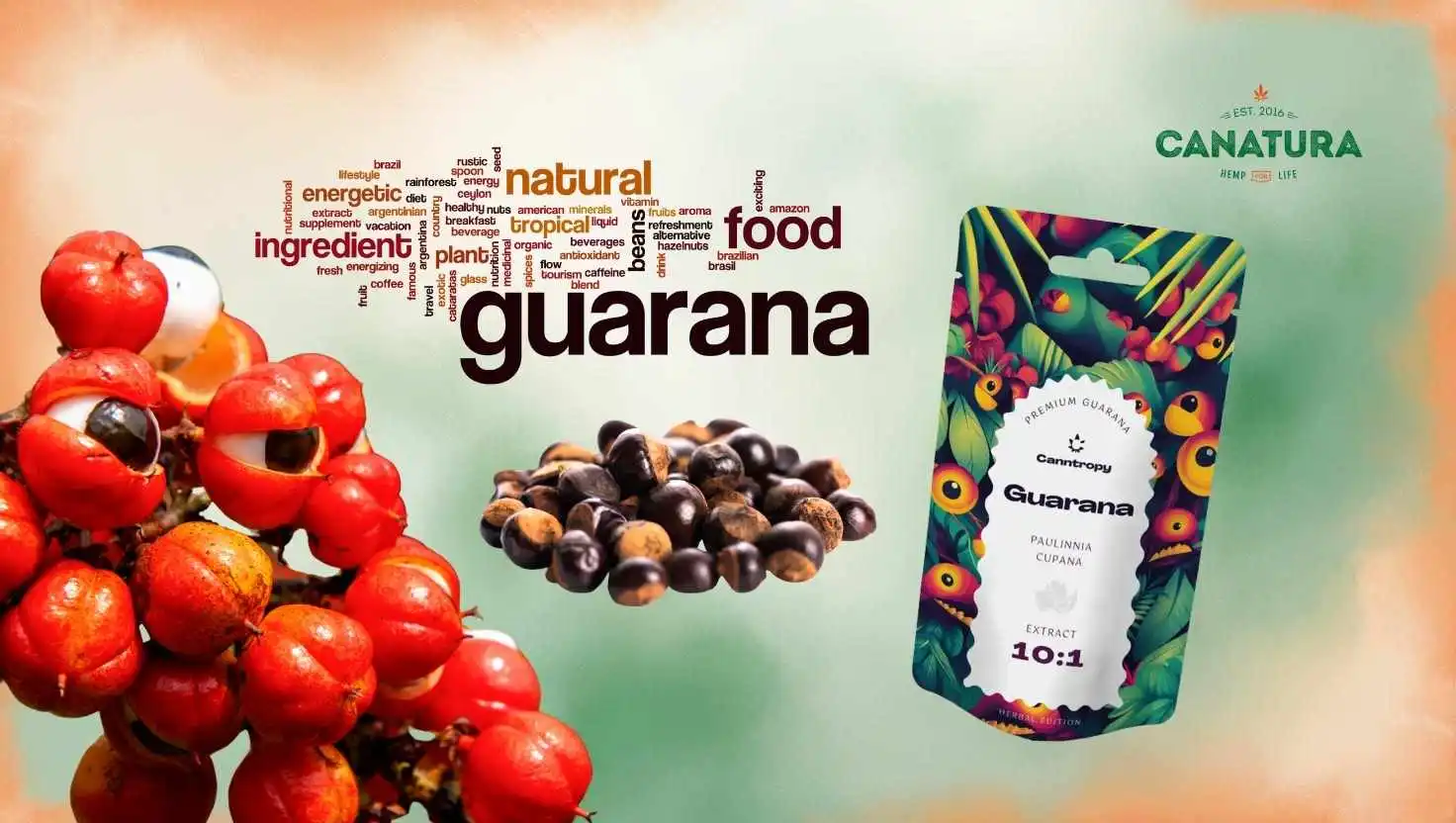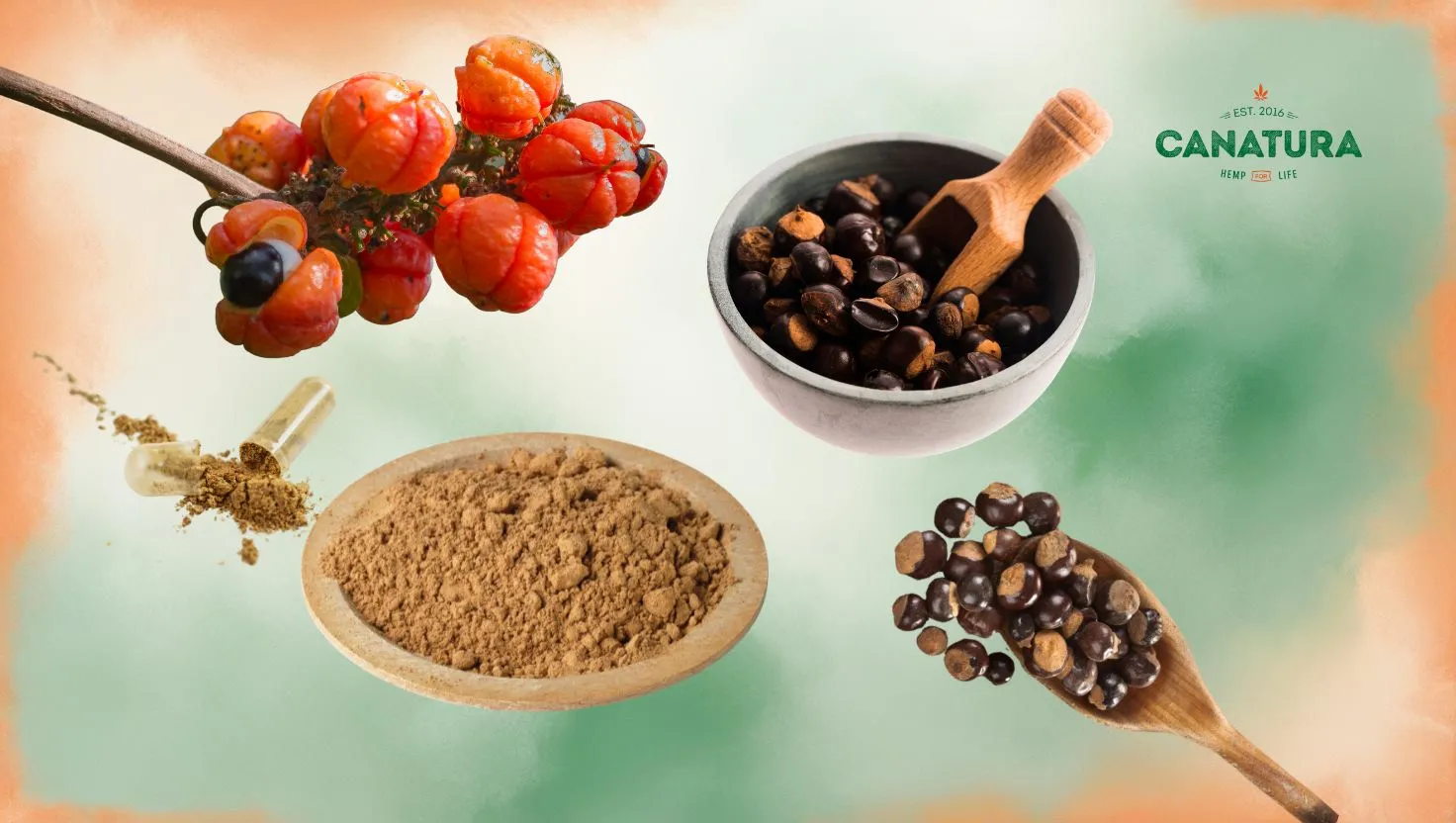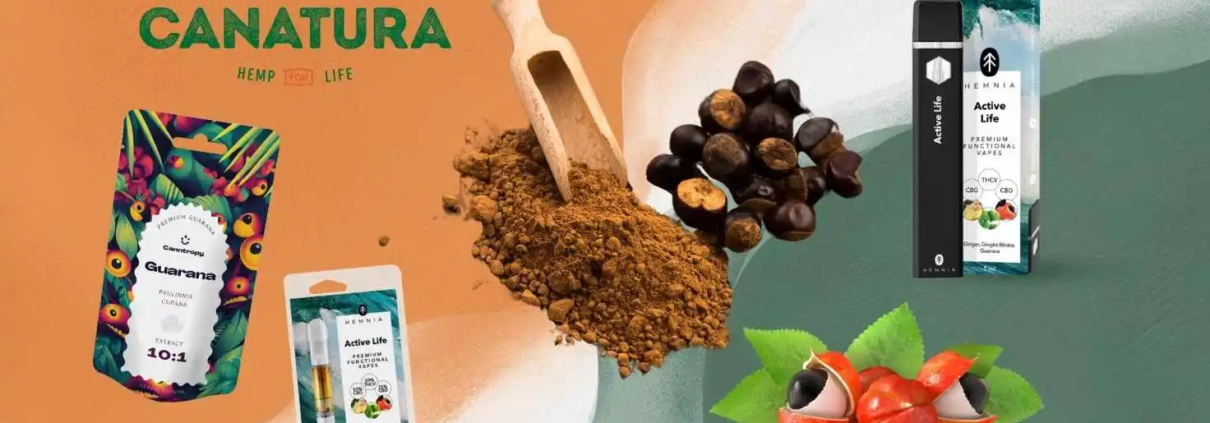Boost your body and mind: Discover guarana, a gift from the Amazon rainforest
- What is guarana?
- The timeless power of an ancient plant
- How is guarana obtained?
- What does guarana powder look and taste like?
- What substances does guarana contain?
- Effects of guarana
- Can guarana be harmful?
- Products containing guarana
- Conclusion
What is guarana?
Guarana, or Paulinia cupana, is a plant native to the Amazon rainforest of South America. It is a woody vine that grows up to 15 m. It has dark green oval leaves, small white flowers and red fruits with white flesh and large black seeds that resemble open eyes. These seeds are valued for their high content of caffeine and other bioactive substances, which have a number of beneficial effects on the human body.

The timeless power of an ancient plant
Although guarana has been used by indigenous Amazonian tribes for centuries, we in Europe only became aware of it at the turn of the 17th and 18th centuries. It got its Latin name Paullinia cupana after the German botanist Christian Franz Paullini. The first reports of its health benefits date back to the 19th century, when doctors recommended it for relief from headaches and migraines.
Today, approximately 70% of cultivated guarana is used to produce energy drinks, while 30% remains in powder form, which is either sold separately or used in other products.
How is guarana obtained?
Guarana is grown in Brazil, with the Maués region being referred to as the ‘land of guarana’. The ripe fruits are harvested from November to March. After harvesting, the guarana undergoes a process of fermentation to separate the seeds from the husk and pulp. The separated seeds are then washed, roasted and ground into a fine powder. The indigenous people then mix this powder with water, form the mixture into sticks, which they dry so that the guarana can be stored more easily and will last for years.
What does guarana powder look and taste like?
Guarana powder is usually light to dark brown in colour, depending on how it is processed. It is finely ground and smells like a combination of coffee, tea and cocoa, with smoky or earthy notes. It has an intense bitter, astringent taste and is therefore often sweetened.

What substances does guarana contain?
Guarana contains two main groups of bioactive ingredients:
- Methylxanthines: Methylxanthines are alkaloids with a stimulating effect. These include, for example, caffeine, theobromine and theophylline.
- Polyphenols: These are powerful antioxidants and anti-inflammatory substances. This group includes, for example, catechin, epicatechin and procyanidin.
Guarana is particularly popular for its high caffeine content — it contains four times more than coffee, ten times more than yerba and thirty times more than cocoa. Guarana seeds can contain up to 8% caffeine!
Effects of guarana
Is guarana healthy? In reasonable doses, guarana is considered a safe and beneficial natural supplement. This substance, full of bioactive ingredients, has enormous therapeutic potential. What is guarana good for?
Performance support
Due to its high caffeine content, guarana has the ability to improve alertness, support cognitive function and physical performance.
Testing on flatworms has shown that guarana has a stronger and longer stimulating effect than caffeine alone thanks to other substances it contains. In lower concentrations (0.01–0.1 mM), it provides longer-lasting stimulation, while at higher doses (10 mM), its effect weakens and can even be toxic. The optimal dosage is therefore crucial to achieve the desired effect.
The study also shows that the effect of guarana can be prolonged when combined with glucose, while this effect was not observed with caffeine alone with glucose. Another study evaluating the effect of guarana on cognitive function showed that guarana is more effective when dissolved in a drink than when taken in capsule form. These results support its use in energy drinks.
Weight loss aid
Guarana may be helpful in weight loss. Research from 2011 showed that regular consumption of guarana may be associated with a lower incidence of obesity.
This theory is also supported by a study from 2017, which showed that guarana may reduce the formation and storage of fat in the body. Other research suggests that guarana may also stimulate energy expenditure. At the same time, it should not reduce appetite.
Metabolism support
Guarana may support metabolism and play a role in preventing metabolic disorders such as high cholesterol or diabetes.
This assumption is confirmed, for example, by a study from 2016, in which rats with high cholesterol were given guarana for one month, and it actually lowered cholesterol levels to normal levels.

Antioxidant, anti-inflammatory and neuroprotective effects
Guarana has antioxidant and anti-inflammatory effects, which were confirmed by a study on humans in 2014. These properties play a major role in promoting overall health and it is therefore believed that guarana could also be an effective supplement for brain support and the prevention of neurodegenerative diseases.
Research from 2020 even suggested that guarana, in low doses, may protect nerve cells from damage by limiting excessive activation of microglia. Excessive activation of microglia contributes to the development of neurodegenerative diseases such as Alzheimer’s and Parkinson’s disease.
In addition, guarana has been found to help prevent the accumulation of harmful proteins in the brain that contribute to the development of Alzheimer’s disease.
Potential anti-cancer effects
A 2016 study suggests that guarana may slow the growth of cancer cells, increase the effectiveness of chemotherapy and promote apoptosis — a natural process that helps eliminate cells with damaged DNA without inflammation.
Liver protection
Research from 2014 showed that guarana could protect the liver and reduce DNA damage. In the experiment, rats were exposed to CCl4, a toxic substance that damages the liver. Animals that had previously been given guarana in various doses showed significantly lower levels of the liver enzymes ALT and AST, which signal liver damage, as well as less DNA damage in liver cells.
Better vision
Research from 2017 showed that guarana, in low doses, can reduce damage and death of retinal cells, suggesting its potential in preventing age-related eye diseases. The study also reports that older people who regularly consume guarana are more likely to rate their vision as good.
Can guarana be harmful?
Excessive consumption of guarana may lead to side effects associated with high caffeine content, such as insomnia, nervousness or digestive problems.
Although scientific studies to date suggest many positive effects of guarana, most of them have been conducted mainly in laboratory conditions and on animals, so further research in humans is needed to reliably confirm these effects.
If you decide to use guarana, use it in moderation and listen to your body.
Products containing guarana
In addition to a range of energy drinks, guarana is also found in other special drinks, foods and cosmetics. It can even be found in e-liquids for vapes.
Dietary supplements and capsules containing guarana are also available. Pure guarana can be purchased as an extract.
Conclusion
Guarana is a plant native to the Amazon that produces seeds rich in caffeine and other valuable bioactive substances. In addition to supporting mental and physical performance, it could be an effective aid in weight loss and metabolism regulation. It has antioxidant, anti-inflammatory and neuroprotective properties, potential anti-cancer effects, and protects the liver and eyesight.
Although almost three-quarters of guarana is grown for the production of energy drinks, it can also be found in food, cosmetics and even e-liquids. It is also added to food supplements and can be purchased separately as an extract.
Author: Natálie Kubíčková
Photo: AI
“All information provided on this website, as well as information provided through this website, is for educational purposes only. None of the information contained herein is intended to be a substitute for a medical diagnosis and should not be considered medical advice or recommended treatment. This website does not endorse, condones or advocate the licit or illicit use of narcotic drugs or psychotropic substances or the commission of any other illegal activity. For more information, please see our Disclaimer .”


